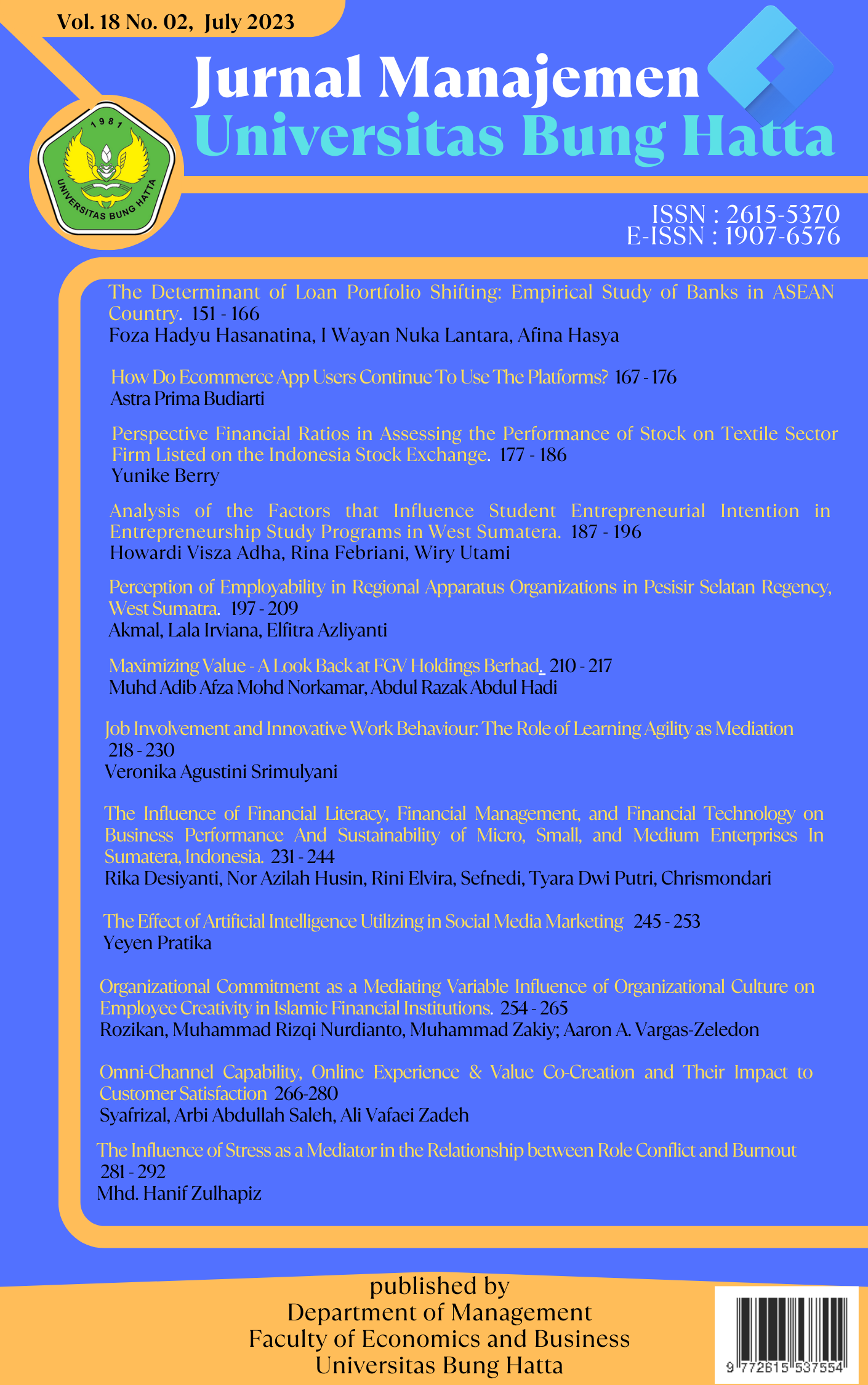The Effect of Leader-Member Exchange(LMX), Organization-Based Self-Esteem and The Broad Role of Self-Efficacyon Predictors of Perception Employability
DOI:
https://doi.org/10.37301/jmubh.v18i2.23243Abstract
This study focuses on individuals as employees and their work-related capabilities. It emphasizes the need for individuals to take ownership of their professional development, acknowledge their employability, and adopt a contemporary career outlook that considers employability beyond their current organization. suggested that employability is an asset that can improve performance and flexibility. To explore the factors that influence employability perception, we tested five hypotheses: leader-member exchange, the broad role of self-efficacy, and organization-based self-esteem. Using regression analysis with SEM PLS, we analyzed data from 323 questionnaires, representing a response rate of 97.52%. Our findings indicate that leader-member exchange positively affects employability perception, organization-based self-esteem positively affects employability perception, and the role of self-efficacy positively affects employability perception. Additionally, leader-member exchange positively affects both organization-based self-esteem and the extent of the role of self-efficacy.
References
Abbas, Q., & Yaqoob, S. (2009). Effect of Leadership Development on Employee Performance in Pakistan. Pakistan.
Ahmed, H., Nawaz, S., & Imran Rasheed, M. (2019). Self-efficacy, Self-Esteem, and Career Success: The Role of Perceived Employability. Journal of Management Sciences. https://doi.org/10.20547/jms.2014.1906202
Akram, M. W., Mahar, S., & Ullah, M. (2017). The Influence of Organization Based Self-Esteem, Role Breadth Self-Efficacy and Voluntary Learning Behavior on Career Success through Mediation of Perceived Employability: A Case of Pakistani Banking. Global Regional Review. https://doi.org/10.31703/grr.2017(ii-i).18
Arshadi, N., & Damiri, H. (2013). The Relationship of Job Stress with Turnover Intention and Job Performance: Moderating Role of OBSE. Procedia - Social and Behavioral Sciences. https://doi.org/10.1016/j.sbspro.2013.06.631
Bandura, A. (2000). Self-efficacy: The foundation of agency. In Control of human behavior, mental processes, and consciousness: Essays in honor of the 60th birthday of August Flammer.
Berdicchia, D. (2015). The relationship between LMX and performance : The mediating role of role breadth self efficacy and Crafting Challenging Job Demands. Journal of Management.
Berntson, E., & Marklund, S. (2007). The relationship between perceived employability and subsequent health. Work & Stress, 21(3), 279–292. https://doi.org/10.1080/02678370701659215
Chunlin, Y. (2019). Fat Nutrition in Meat Products and Leader-member Communication in Food Enterprises. ARCHIVOS LATINOAMERICANOS DE NUTRICION.
Dam, V., Oreg, K., & Schyns, S. (2008). Development Climate, and Resistance to Change. In Development Climate, and Resistance to Change. https://doi.org/10.1111/j.1464-0597.2007.00311.x
de Cuyper, N., & de Witte, H. (2011). The management paradox: Self-rated employability and organizational commitment and performance. Personnel Review. https://doi.org/10.1108/00483481111106057
Erez, A., & Isen, A. M. (2002). The influence of positive affect on the components of expectancy motivation. Journal of Applied Psychology. https://doi.org/10.1037/0021-9010.87.6.1055
Gooty, J., & Yammarino, F. J. (2016). The Leader–Member Exchange Relationship: A Multisource, Cross-Level Investigation. Journal of Management. https://doi.org/10.1177/0149206313503009
Graen, G.B., Uhl-Bien, M. (1995). Relationship Based Approach to Leadership. Leadership Quarterly. https://doi.org/10.1115/gt2016-57374
Haggard, D. L., & Park, H. M. (2018). Perceived supervisor remorse, abusive supervision, and LMX. Journal of Organizational Behavior. https://doi.org/10.1002/job.2285
Kemery, E. R., Mossholder, K. W., & Bedeian, A. G. (1987). Role stress, physical symptomatology, and turnover intentions: A causal analysis of three alternative specifications. Journal of Organizational Behavior. https://doi.org/10.1002/job.4030080103
Liden, R. (1998). Multidimensionality of leader-member exchange: An empirical assessment through scale development. Journal of Management. https://doi.org/10.1016/s0149-2063(99)80053-1
Lu, X., & Sun, J. M. (James). (2017). Multiple pathways linking leader-member exchange to work effort. Journal of Managerial Psychology. https://doi.org/10.1108/JMP-01-2016-0011
Martin, R., Guillaume, Y., Thomas, G., Lee, A., & Epitropaki, O. (2016). Leader–Member Exchange (LMX) and Performance: A Meta-Analytic Review. Personnel Psychology. https://doi.org/10.1111/peps.12100
Park, Y. (2020). The effects of leader-member exchange and employee learning on perceived employability. International Journal of Training and Development. https://doi.org/10.1111/ijtd.12174
Parker, S. K. (1998). Enhancing role breadth self-efficacy: The roles of job enrichment and other organizational interventions. Journal of Applied Psychology. https://doi.org/10.1037/0021-9010.83.6.835
Radzi, N. I. M., & Othman, R. (2016). Resistance to Change: The Moderating Effects of Leader-Member Exchange and Role Breadth Self-Efficacy. Journal of Advanced Management Science. https://doi.org/10.12720/joams.4.1.72-76
Rafferty, A. E., & Restubog, S. L. D. (2011). The influence of abusive supervisors on followers’ organizational citizenship behaviours: The hidden costs of abusive supervision. British Journal of Management. https://doi.org/10.1111/j.1467-8551.2010.00732.x
Rothwell, A., & Arnold, J. (2007). Self‐perceived employability: development and validation of a scale. Personnel Review, 36(1), 23–41. https://doi.org/10.1108/00483480710716704
Van Der Heijden, B., Boon, J., Van Der Klink, M., & Meijs, E. (2009). Employability enhancement through formal and informal learning: An empirical study among Dutch non-academic university staff members. International Journal of Training and Development. https://doi.org/10.1111/j.1468-2419.2008.00313.x
Wittekind, A., Raeder, S., & Grote, G. (2010a). A longitudinal study of determinants of perceived employability. Journal of Organizational Behavior. https://doi.org/10.1002/job.646
Wittekind, A., Raeder, S., & Grote, G. (2010b). A longitudinal study of determinants of perceived employability. Journal of Organizational Behavior. https://doi.org/10.1002/job.646
Downloads
Published
Issue
Section
License
Copyright (c) 2023 Akmal Akmal, Lala Irviana, Elfitra Azliyanti

This work is licensed under a Creative Commons Attribution-ShareAlike 4.0 International License.
Authors who publish with Jurnal Manajemen Universitas Bung Hatta agree to the following terms:
- Authors retain copyright and grant the journal right of first publication with the work simultaneously licensed under a Creative Creative Commons Attribution-ShareAlike 4.0 International License that allows others to share the work with an acknowledgement of the work's authorship and initial publication in Jurnal Manajemen Universitas Bung Hatta.
- The author holds the copyright of the submitted and published articles, with the understanding that articles are disseminated under the Creative Commons Attribution-ShareAlike 4.0 International License..
- The editor team is entitled to do the editing in accordance with the guidelines for writing or template in the Jurnal Manajemen Universitas Bung Hatta.
This work is licensed under a Creative Commons Attribution-ShareAlike 4.0 International License.












